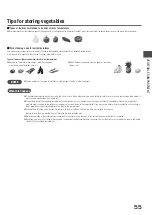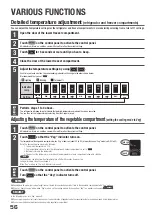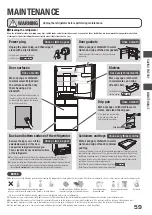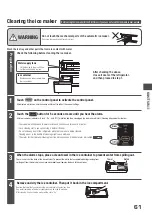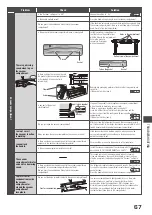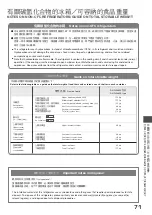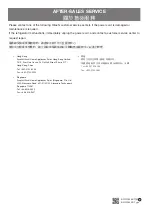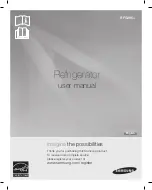
68
Strange odors
The ice cubes smell.
The inside of
the refrigerator
smells.
Did you store food that has a strong odor in the
refrigerator?
The deodorizing function does not eliminate all odors. Cover foods that have
strong odors, with a lid or by using plastic wrap.
If you used tap water to make ice, chlorine in the tap water might have
condensed, causing a strong odor of chlorine.
Is the water supply tank or water filter dirty? Have the ice
cubes been sitting in the ice container for a long time?
To prevent the accumulation of viscous liquid and the formation of slime or
water stains, wash the tank and filter regularly.
There is a plastic
odor.
This does not indicate any problem in the refrigerator’ s function.
The refrigerator has many plastic parts. As the refrigerator get colder, the plastic
odor should gradually dissipate.
TROUBLESHOOTING
(continued)
The sides of
the refrigerator
are hot. I feel hot air
coming from under
the refrigerator.
The refrigerator might become hot as it lets out the heat generated during
operation. Immediately after installation or in summer, the temperature of the
refrigerator’ s external surfaces might rise to 50°C to 60°C. This does not
indicate any problem in the refrigerator’ s function or safety. However, try to
avoid touching the refrigerator’ s sides.
Overheating of
the refrigerator
Strange sounds
The refrigerator is
making loud sounds.
The refrigerator is
making other sounds,
such as those
described on the right.
Is the floor uneven?
Place the refrigerator on top of a sturdy board that is at least 1 cm thick or
thicker.
Is the refrigerator sufficiently cold?
In the following cases, the compressor runs at a high speed, creating loud
sounds:
・
If the refrigerator is not sufficiently cold (for example, right after purchase or
when you begin using it)
・
If you open and close the refrigerator doors frequently
・
If the ambient temperature is high
Is the ice maker set to “Quick”“Quick Freeze”?
When the ice maker is set to “Quick” “Quick Freeze”, the compressor and fan
motor run at high speeds, creating loud sounds.
The refrigerator
continues to
emit sounds for
a long time.
To save energy, the compressor runs at a lower speed, accounting for the
longer sound.
Rattling, sizzling, and other occasional sounds
This does not indicate a problem in the refrigerator’ s function.
(These sounds might be created when the refrigerator starts or stops its cooling
process.)
The sound of
the refrigerator is
getting louder.
The refrigerator changes its operating power based on changes in temperatures
inside its compartments. As a result, sometimes, the sound of the refrigerator
might become louder.
Trickling, tapping, bubbling, or sizzling
This does not indicate a problem in the refrigerator’ s function.
(These sounds might be created by flowing refrigerant, water generated by the
defrosting function, and water evaporating.)
Creaking, squeaking, or knocking
This does not indicate a problem in the refrigerator’ s function.
These sounds might be created when changes in the refrigerator’ s temperature
or changes in the pressure of the vacuum compartment cause various
refrigerator parts to creak.
Rattling, buzzing, or humming
(after the refrigerator doors are closed)
This does not indicate a problem in the refrigerator’ s function.
These sounds might be created when refrigerator’ s temperature control
mechanism or vacuum pump is running.
Is the refrigerator touching any walls or other
appliances/furniture?
Leave space around the refrigerator.
Check
Solution
Problem
P.51
P.60, 61
P.42
Whirring, clattering, gurgling, and other sounds made
by the ice maker
This does not indicate a problem in the refrigerator’ s function.
These sounds might be created when ice cubes fall from the ice tray or when
the tray is filled with water.
When you do not need to make ice, touch the button to change the ice
maker setting to “Off”.


